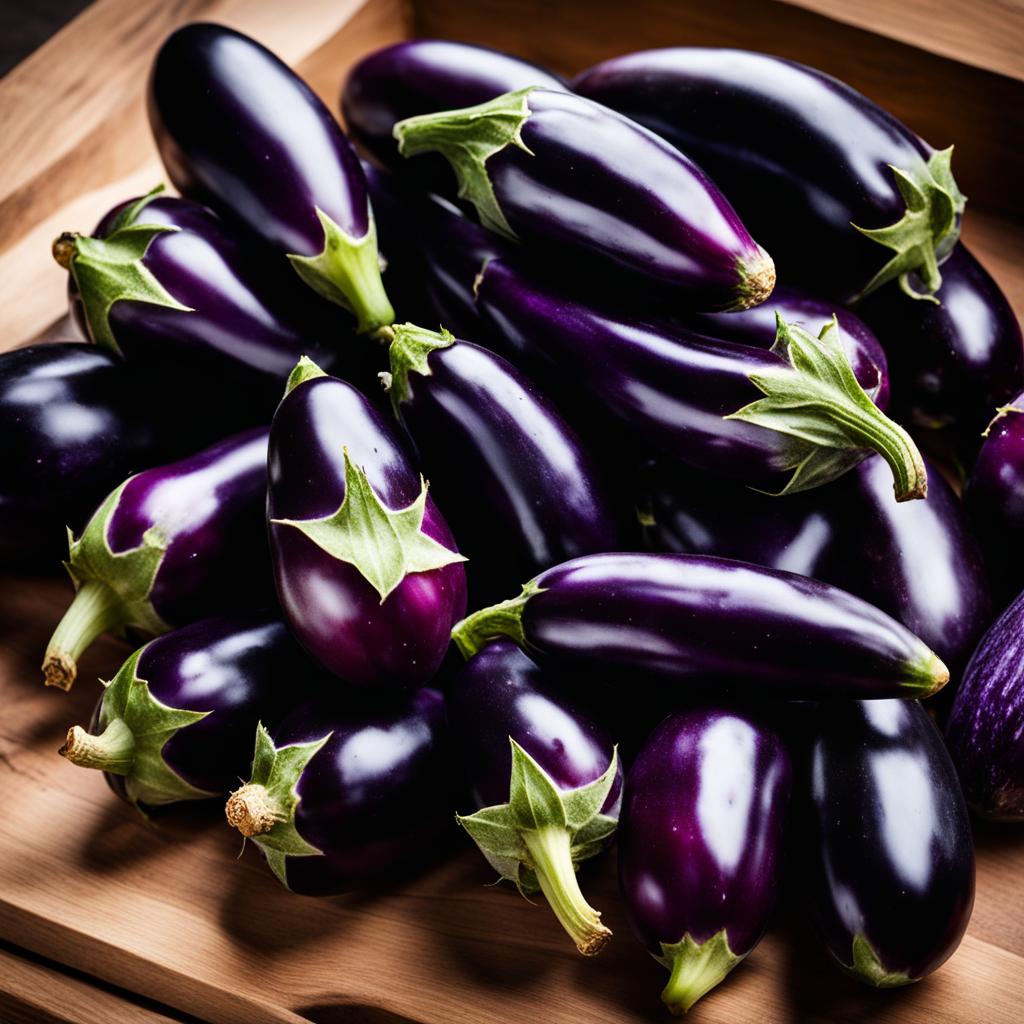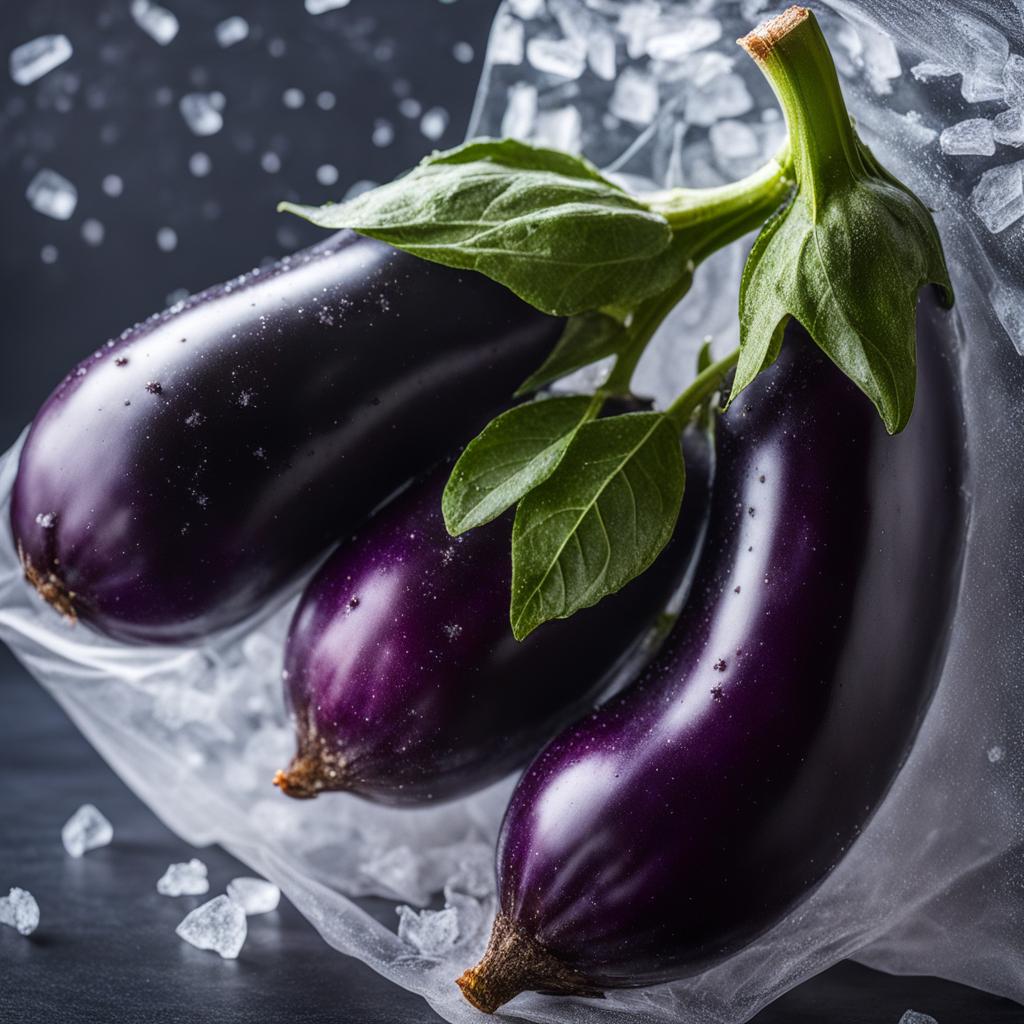Eggplant is a versatile vegetable that can be used in various culinary creations, but it’s important to store it properly to maintain its freshness. Let me show you the best methods for storing eggplant to keep it fresh and maximize its shelf life.
Key Takeaways:
- Proper storage is crucial for maintaining the flavor and quality of eggplant.
- Choose ripe eggplants that are heavy, firm, and have a solid texture.
- Store eggplant at room temperature if you plan on using it within two days.
- Refrigerate eggplant if you don’t plan on using it within a couple of days.
- Avoid moisture and browning by storing eggplant in an airtight container.
Understanding Eggplant Storage
Eggplant, with its delicate nature, requires proper storage to maintain its freshness and extend its shelf life. It is sensitive to light, heat, and cold, and can quickly decompose if not stored correctly. By understanding the best practices for eggplant storage, you can ensure that your eggplant stays fresh and flavorful for longer periods.
When it comes to eggplant storage, there are two main options to consider: room temperature and refrigerator storage. Let’s explore the details of each method and how they impact the shelf life of eggplant.
Room Temperature Storage
If you plan to use your eggplant within two days, storing it at room temperature is a viable option. Find a cool, dry place in your kitchen, away from direct sunlight. It is crucial to keep the eggplant separate from fruits or vegetables that release ethylene gas, as this can accelerate the ripening process and lead to spoilage. By following these guidelines, you can enjoy fresh and flavorful eggplant during its short shelf life at room temperature.
Refrigerator Storage
If you don’t plan to use your eggplant within a couple of days, refrigeration is the best method for prolonging its shelf life. Before refrigerating, wrap the eggplant in a paper towel to absorb excess moisture and place it in the crisper drawer of your refrigerator. This helps maintain the freshness and texture of the eggplant for up to a week. It’s worth noting that refrigeration may slightly alter the taste and texture of the eggplant, so it’s best to use it as soon as possible for optimal flavor.
By understanding the factors that impact eggplant storage and following the recommended guidelines, you can preserve the quality and taste of this versatile vegetable. Whether you choose room temperature or refrigerator storage, proper handling and storage will ensure that your eggplant stays fresh and delicious for your culinary creations.
| Storage Method | Shelf Life |
|---|---|
| Room Temperature | 1-2 days |
| Refrigeration | Up to 1 week |
Choosing the Right Eggplant
When it comes to selecting an eggplant, you want to make sure you choose one that is ripe and ready to be used in your culinary creations. The right eggplant will have a firm texture and feel heavy in your hand. Avoid underripe eggplants that have no give when pressed, as they may taste bitter and have a tough texture. Similarly, overly soft or mushy eggplants are a sign of overripeness and should be avoided.
One way to check if an eggplant is ripe is by looking at its color. Ripe eggplants typically have a deep, glossy skin, and the color will vary depending on the variety. For example, the classic globe eggplant should have a rich purple color, while smaller varieties like Japanese or Thai eggplants may be lighter in color. It’s important to note that eggplants can still be ripe even if they have some slight discoloration or blemishes on their skin.
When selecting an eggplant, also pay attention to the stem. A fresh eggplant should have a green, sturdy stem. If the stem is brown or dried out, it’s an indication that the eggplant is not as fresh. Additionally, make sure there are no signs of mold or soft spots on the skin, as these can be signs of spoilage.
Table: Eggplant Color Varieties
| Variety | Color |
|---|---|
| Globe Eggplant | Deep purple |
| Japanese Eggplant | Light purple to dark purple |
| Thai Eggplant | Green to light purple |
By choosing a ripe and fresh eggplant, you’ll set yourself up for success in your culinary endeavors. The right eggplant will not only taste better but also ensure that your dishes are flavorful and satisfying.
Storing Eggplant at Room Temperature
If you plan on using your eggplant within two days, you can store it at room temperature. Find a cool, dry place like your kitchen counter to keep it away from sunlight. Avoid storing it near fruits or vegetables that release ethylene gas, as this can accelerate the ripening process and spoil the eggplant faster.
To ensure proper storage, follow these steps:
- Choose a suitable spot: Select a location that is cool, dry, and away from direct sunlight. This will help maintain the eggplant’s quality and prevent premature spoilage.
- Avoid ethylene exposure: Ethylene gas can be released by certain fruits and vegetables, such as bananas and tomatoes, and can speed up the ripening process of nearby produce. Keep your eggplant away from ethylene-producing foods to prevent it from becoming overripe too quickly.
- Inspect regularly: Check your eggplant daily for any signs of spoilage, such as soft spots, browning, or an unpleasant odor. If you notice any of these signs, it’s best to discard the eggplant to avoid potential health risks.
By following these guidelines, you can ensure that your eggplant stays fresh and ready for use when stored at room temperature.

Table: Comparison of Room Temperature Storage vs. Refrigeration
| Room Temperature Storage | Refrigeration | |
|---|---|---|
| Shelf Life | 1-2 days | Up to a week |
| Temperature | Approximately 68-77°F (20-25°C) | Approximately 41-45°F (5-7°C) |
| Ethylene Exposure | Avoid storing near ethylene-producing foods | Does not affect storage |
| Monitoring | Inspect daily for signs of spoilage | Inspect regularly for signs of spoilage |
Storing Eggplant in the Refrigerator
Eggplant is a delicate vegetable that requires proper storage to maintain its freshness and quality. If you don’t plan on using your eggplant within a couple of days, refrigeration is the best option. Refrigerating eggplant helps to slow down the ripening process and extend its shelf life, allowing you to enjoy it for longer.

Table: Freezing Eggplant Guide
| Steps | Instructions |
|---|---|
| 1. | Blanch the eggplant in boiling water for 3-4 minutes. |
| 2. | Transfer the blanched eggplant to ice water to cool it down. |
| 3. | Drain the cooled eggplant and pat it dry. |
| 4. | Portion the eggplant into desired sizes. |
| 5. | Place the eggplant in airtight containers or freezer-safe bags. |
| 6. | Remove as much air as possible to prevent freezer burn. |
| 7. | Label the containers or bags with the date of freezing. |
| 8. | Store the frozen eggplant in the freezer for up to a year. |
Shelf Life of Eggplant
Eggplant, when stored correctly, can have varying shelf lives depending on the storage method. Whether you choose to store it at room temperature, in the refrigerator, or freeze it, it’s important to understand how long you can expect your eggplant to last.
When stored at room temperature, eggplant typically has a shelf life of 1-2 days. This is ideal if you plan on using it quickly in your meals. However, it’s important to note that room temperature storage may cause the eggplant to spoil faster due to its sensitivity to heat and light. Therefore, it’s best to utilize this method only if you intend to consume the eggplant within a couple of days.
If you need to extend the shelf life of your eggplant, refrigeration is the way to go. When stored in the refrigerator, eggplant can last for up to a week. Make sure to wrap it in a paper towel to absorb any excess moisture and place it in the crisper drawer to maintain its freshness. By keeping your eggplant chilled, you can enjoy it for a longer period.
| Storage Method | Shelf Life |
|---|---|
| Room Temperature | 1-2 days |
| Refrigeration | Up to a week |
| Freezing | Up to a year |
For even longer storage, freezing is a great option. Both raw and cooked eggplant can be frozen successfully. By blanching the eggplant pieces first, you can preserve their quality and flavor for up to a year. Just make sure to place the blanched pieces in airtight containers or freezer-safe bags to prevent freezer burn.
It’s important to note that these guidelines are general recommendations. The actual shelf life of your eggplant may vary depending on its freshness at the time of purchase and the conditions in which it was stored before you brought it home. Always check for signs of spoilage such as a soft texture, dull skin, soft spots, or an unpleasant odor before consuming your eggplant.
Signs of Spoiled Eggplant
Knowing the signs of spoiled eggplant is essential to ensure that you are using fresh and safe ingredients in your culinary creations. Here are the key indicators that can help you determine if your eggplant has gone bad:
- Soft texture: When eggplant starts to spoil, the flesh becomes mushy and loses its firmness.
- Dull skin: A fresh eggplant has a glossy, vibrant skin. If the skin appears dull and wrinkled, it is a sign of deterioration.
- Soft spots: Check for any soft spots or areas that feel slimy to the touch. These are indications of bacterial or fungal growth.
- Unpleasant odor: Spoiled eggplant emits a strong, unpleasant smell that is noticeably different from its fresh aroma.
- Browning flesh: Cut into the eggplant, and if the flesh is brown instead of creamy-white, it is a clear sign of spoilage.
If you observe any of these signs in your eggplant, it is best to discard it to avoid any potential health risks. Consuming spoiled eggplant can lead to food poisoning or gastrointestinal issues. It is always better to be safe than sorry when it comes to the quality of your ingredients.
Remember to store your eggplant properly to help prolong its freshness and reduce the risk of spoilage. By following the recommended storage methods and being vigilant about the signs of spoilage, you can enjoy delicious and healthy eggplant in your meals.
| Signs of Spoiled Eggplant | Indications |
|---|---|
| Soft texture | Mushy and lacking firmness |
| Dull skin | Wrinkled and lacking glossiness |
| Soft spots | Areas that are slimy or offer no resistance |
| Unpleasant odor | A strong, off-putting smell |
| Browning flesh | Flesh that appears brown instead of creamy-white |
Keep in mind that proper storage and regular inspections are key to avoiding spoiled eggplant and ensuring the best quality for your recipes. When in doubt, trust your senses and opt for fresh eggplant to elevate your culinary creations.
Conclusion
Properly storing eggplant is crucial to maintain its flavor and quality. Whether you choose to store it at room temperature or in the refrigerator, following the recommended guidelines for temperature, moisture, and ethylene exposure will help extend its shelf life. Freezing is a great preservation method for longer storage. Enjoy fresh and tasty eggplant in your culinary creations by storing it correctly.
FAQ
How long does eggplant last?
The shelf life of eggplant varies depending on the storage method. At room temperature, eggplant can last for 1-2 days. When refrigerated, it can last for about a week. If frozen, eggplant can stay fresh for up to a year.
How should I choose a ripe eggplant?
Look for eggplants that are heavy, firm, and have a solid texture. Avoid underripe ones that have no give when pressed, as well as ones that feel too soft or mushy, as they may be overripe.
Can I store eggplant at room temperature?
Yes, you can store eggplant at room temperature if you plan to use it within two days. Find a cool, dry place like your kitchen counter and keep it away from sunlight. Avoid storing it near fruits or vegetables that release ethylene gas, as this can accelerate the ripening process.
How do I store eggplant in the refrigerator?
To store eggplant in the refrigerator, wrap it in a paper towel and place it in the crisper drawer. This will help maintain its freshness and extend its shelf life for up to a week.
How can I prevent eggplant from browning?
To prevent browning, avoid cutting the eggplant until you’re ready to use it. If you need to store cut eggplant, transfer it to an airtight container or bag and use it within three to four days. Adding lemon juice can help prevent enzymatic browning.
Can I freeze eggplant?
Yes, both raw and cooked eggplant can be frozen. Blanch the eggplant pieces before freezing, then place them in airtight containers or freezer-safe bags. Frozen eggplant can stay fresh for up to a year.
What are the signs of spoiled eggplant?
A soft texture, dull skin, soft spots, and an unpleasant odor are signs that eggplant has gone bad. When cutting into an eggplant, the flesh should be mostly white, not brown. If the eggplant exhibits any of these signs, it’s best to discard it to avoid any potential health risks.
Source Links
- https://www.realsimple.com/how-to-store-eggplant-7561406
- https://www.epicurious.com/expert-advice/how-to-store-eggplant
- https://www.allrecipes.com/article/how-to-store-eggplant/
Related Recipes:
 How to Cut Eggplant: Tips for Perfect Dishes
How to Cut Eggplant: Tips for Perfect Dishes
 How to Cut Eggplant? (Easy Step-By-Step Guide)
How to Cut Eggplant? (Easy Step-By-Step Guide)
 Does Almond Milk Go Bad? How to Tell and Storage Tips.
Does Almond Milk Go Bad? How to Tell and Storage Tips.
 Does Peanut Butter Go Bad? Shelf Life and Storage Tips
Does Peanut Butter Go Bad? Shelf Life and Storage Tips
 Can You Eat Expired Butter? What You Need to Know
Can You Eat Expired Butter? What You Need to Know
 How to Store Citrus Fruits for Best Flavor
How to Store Citrus Fruits for Best Flavor
 How to Store Baked Goods to Keep Them Fresh
How to Store Baked Goods to Keep Them Fresh
 How to Store Carrots? (Perfect Every Time!)
How to Store Carrots? (Perfect Every Time!)








